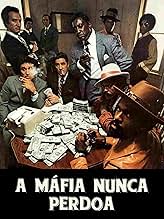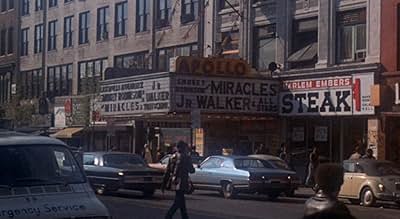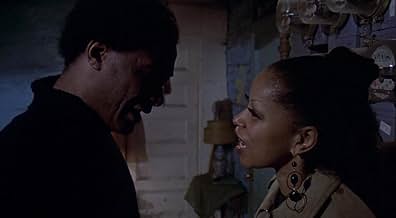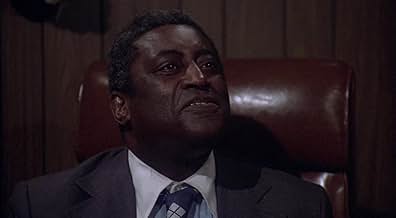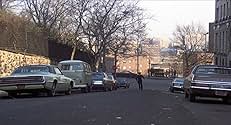CALIFICACIÓN DE IMDb
7.0/10
7.8 k
TU CALIFICACIÓN
Dos policías de Nueva York persiguen a unos ladrones aficionados que intentan estafar a la Mafia e iniciar una guerra de bandas.Dos policías de Nueva York persiguen a unos ladrones aficionados que intentan estafar a la Mafia e iniciar una guerra de bandas.Dos policías de Nueva York persiguen a unos ladrones aficionados que intentan estafar a la Mafia e iniciar una guerra de bandas.
- Dirección
- Guionistas
- Elenco
Joseph Attles
- Mr. Jessup
- (as Joe Attles)
Anthony C. Cannon
- Sal
- (as Anthony Cannon)
George DiCenzo
- Patrolman
- (as George Di Cenzo)
- Dirección
- Guionistas
- Todo el elenco y el equipo
- Producción, taquilla y más en IMDbPro
Opiniones destacadas
I caught this on BBC 1 one night many years ago . I forgot the title but could vividly remember a number of scenes especially a line of dialogue where two characters describe a third one having his genitals mutilated . This type of movie would be broadcast on television 30 years ago and no one would blink an eyelid but at the same time you can understand why it wouldn't be shown on network TV today . It as also a sign of the times back then that the TV broadcast had the F word overdubbed to something less offensive but the racial slurs against both black and whites remained intact . Perhaps the fact this film is consciously insensitive and hard hitting works against it ? This is a pity because it's not some " Blaxploitation " fare but more of a New Hollywood thriller at its best
The story itself is no great shakes - a couple of black dudes rip off and kill a few members of the Mafia and the black underworld and also kill a couple of uniformed cops in the process and find if not the entire world against them then at least the law enforcers and law breakers of NYC wanting to cap their ass . It's the sort of film Tarantino has been inspired by but unlike Tarantino's work this movie is devoid of post modernism and crippling self indulgence and is a relatively tightly plotted screenplay where lots of nasty things happen to lots of nasty people . There's a subplot featuring character interaction between Anthony Quinn's nasty racist white cop and Yaphet Kotto's not very nasty by the books black cop that might have been clichéd but does seem fresh and realistic , probably down to the fact the performances and writing portraying a rather amoral relationship between the two men and the wider world . And this does feel like an exceptionally amoral film that we never see nowadays more is the pity
The story itself is no great shakes - a couple of black dudes rip off and kill a few members of the Mafia and the black underworld and also kill a couple of uniformed cops in the process and find if not the entire world against them then at least the law enforcers and law breakers of NYC wanting to cap their ass . It's the sort of film Tarantino has been inspired by but unlike Tarantino's work this movie is devoid of post modernism and crippling self indulgence and is a relatively tightly plotted screenplay where lots of nasty things happen to lots of nasty people . There's a subplot featuring character interaction between Anthony Quinn's nasty racist white cop and Yaphet Kotto's not very nasty by the books black cop that might have been clichéd but does seem fresh and realistic , probably down to the fact the performances and writing portraying a rather amoral relationship between the two men and the wider world . And this does feel like an exceptionally amoral film that we never see nowadays more is the pity
"Across 110th Street" was more than just a cliché (yet it was full of them), it was deep and developed (yet had a simplistic story about cops and criminals), it was gritty and honest (yet overly-so enough to make you gasp, not laugh), and it was pure, uncut, cinematic genius from beginning to the wildly unseen ending. There were plenty of pitfalls for "Across 110th Street" to fall into, but it continually saved itself by being genuine and dark throughout. While the editing, albeit pure 70s cinema, was completely tangent, the film itself demonstrated the raw force of truth, giving us a rare (yet fictional) story of the changing of the guard in Harlem, the truth of its streets, and the minds of its criminals.
Sounding like a scene right out of "Dead Presidents", our story begins with three African Americans stealing money from the mob, only to transform the simple robbery into a battleground, equipped with machine gun fire and plenty of cops caught in the line of fire. Needless to say, both sides the Italian mob who currently has a strong hold on the crime in Harlem as well as both the upcoming African American police Lieutenant (played by Yaphet Kotto) and the decaying corrupt Captain (played by Anthony Quinn) are ready to do whatever it takes to bring these men to justice. Our plot device suddenly becomes a ticking clock, with our minds in constant question as to who is going to get to the finish line first. What keeps this cliché device from sounding stale is director Barry Shear's ability to take us through each of the three story lines with nobody eating from the sweet cake of victory at any given time. "Across 110th Street" is not a comfortable story. The characters are flawed, the imagery is sandpaper rough, and the language is honest. Shear has made this film during a time where corruption is used to represent the mindset of the community. Harlem is not shown in a productive light, but then neither is the police nor the mob. What makes "Across 110th Street" feel like a science experiment is that you see the decay of the community implode systematically. From the simple thugs who begin the robbery, to the Italian mob who is just as brutal but with better suits, all the way to the police who use the same tactics, but are protected (supposedly) by a badge, this film explores the explosion of corruption in a bold new way that eliminates cliché, yet builds on honesty.
Shear's ability to build the story into the camera's frame is only the stepping stone of this film. The unrelenting ending could only have occurred with the power of the actors in front of the camera. Their work is simple, at times one could even call it amateurish, but Quinn and Kotto do a phenomenal job of keeping the story, and their characters, grounded at all times. Their beats could have been tightened, but their flaws build upon the chaos of this story. Their facial expressions alone are worth their weight in gold, especially Quinn's ending glare. As Quinn and Kotto were our leads for this film, what stands out is how similar they are to their flawed mobsters and criminals. With our lead mobsters racism coupled with our medial issues of our criminals, we see a blend between them all. While they are all different characters, Shear brings them all together with small similarities. For someone jumping into the middle of this film, one would have trouble guessing who were the "real" bad guys, the guys with the guns or the guys with the badges. That is the next layer of "Across 110th Street" that could be used in any film studies class across the nation. Not just the visuals of a time filled with racial disgust, but also the fact that the racial divide wasn't in just black and white. Harlem owns the police, yet they are there to uphold the law while perhaps not exactly like that in Harlem today one can see this happening throughout the world in modern society.
Finally, one cannot end a review of "Across 110th Street" without mentioning the music which was icing on the hypothetical cake. To me, the sounds captured the era, the chaos of the music coupled well with the violence happening on screen. The two blended perfectly together, giving us not just a taste of an explosive Harlem, but also the sounds that may have accompanied it. As a child of the 80s, I never was witness to this so to see it (albeit in a form of fiction) only helped to heighten the awareness of this era in NYC.
Overall, "Across 110th Street" was a violent, loud, and turbulent film that was laced with clichés that were forgotten by the next scene. One could easily watch this film on late-night television and never quite see the power behind Shear's camera, or Quinn's acting ability (that final scene still haunts me), or the challenging music that accompanied our visuals, but watching it on a bright and sunny Saturday, the excellence of this film comes full force. The acting was at a perfect pitch for this film, the corruption that Shear demonstrates from across three spectrums adds a level of honesty to a film that could have easily been lost by another director. "Across 110th Street" reminded me of early Scorsese work, the raw grittiness of the city, a city that Shear loved (he filmed in Harlem), coupled with the powerful imagery took me to "Mean Streets" and "Goodfellas", but not "The Departed". This is a cannon of a film, one that should be watched and retained for the sheer honesty of the work, while it is fiction it holds a bit of truth to the turbulence of the world.
Grade: ***** out of *****
Sounding like a scene right out of "Dead Presidents", our story begins with three African Americans stealing money from the mob, only to transform the simple robbery into a battleground, equipped with machine gun fire and plenty of cops caught in the line of fire. Needless to say, both sides the Italian mob who currently has a strong hold on the crime in Harlem as well as both the upcoming African American police Lieutenant (played by Yaphet Kotto) and the decaying corrupt Captain (played by Anthony Quinn) are ready to do whatever it takes to bring these men to justice. Our plot device suddenly becomes a ticking clock, with our minds in constant question as to who is going to get to the finish line first. What keeps this cliché device from sounding stale is director Barry Shear's ability to take us through each of the three story lines with nobody eating from the sweet cake of victory at any given time. "Across 110th Street" is not a comfortable story. The characters are flawed, the imagery is sandpaper rough, and the language is honest. Shear has made this film during a time where corruption is used to represent the mindset of the community. Harlem is not shown in a productive light, but then neither is the police nor the mob. What makes "Across 110th Street" feel like a science experiment is that you see the decay of the community implode systematically. From the simple thugs who begin the robbery, to the Italian mob who is just as brutal but with better suits, all the way to the police who use the same tactics, but are protected (supposedly) by a badge, this film explores the explosion of corruption in a bold new way that eliminates cliché, yet builds on honesty.
Shear's ability to build the story into the camera's frame is only the stepping stone of this film. The unrelenting ending could only have occurred with the power of the actors in front of the camera. Their work is simple, at times one could even call it amateurish, but Quinn and Kotto do a phenomenal job of keeping the story, and their characters, grounded at all times. Their beats could have been tightened, but their flaws build upon the chaos of this story. Their facial expressions alone are worth their weight in gold, especially Quinn's ending glare. As Quinn and Kotto were our leads for this film, what stands out is how similar they are to their flawed mobsters and criminals. With our lead mobsters racism coupled with our medial issues of our criminals, we see a blend between them all. While they are all different characters, Shear brings them all together with small similarities. For someone jumping into the middle of this film, one would have trouble guessing who were the "real" bad guys, the guys with the guns or the guys with the badges. That is the next layer of "Across 110th Street" that could be used in any film studies class across the nation. Not just the visuals of a time filled with racial disgust, but also the fact that the racial divide wasn't in just black and white. Harlem owns the police, yet they are there to uphold the law while perhaps not exactly like that in Harlem today one can see this happening throughout the world in modern society.
Finally, one cannot end a review of "Across 110th Street" without mentioning the music which was icing on the hypothetical cake. To me, the sounds captured the era, the chaos of the music coupled well with the violence happening on screen. The two blended perfectly together, giving us not just a taste of an explosive Harlem, but also the sounds that may have accompanied it. As a child of the 80s, I never was witness to this so to see it (albeit in a form of fiction) only helped to heighten the awareness of this era in NYC.
Overall, "Across 110th Street" was a violent, loud, and turbulent film that was laced with clichés that were forgotten by the next scene. One could easily watch this film on late-night television and never quite see the power behind Shear's camera, or Quinn's acting ability (that final scene still haunts me), or the challenging music that accompanied our visuals, but watching it on a bright and sunny Saturday, the excellence of this film comes full force. The acting was at a perfect pitch for this film, the corruption that Shear demonstrates from across three spectrums adds a level of honesty to a film that could have easily been lost by another director. "Across 110th Street" reminded me of early Scorsese work, the raw grittiness of the city, a city that Shear loved (he filmed in Harlem), coupled with the powerful imagery took me to "Mean Streets" and "Goodfellas", but not "The Departed". This is a cannon of a film, one that should be watched and retained for the sheer honesty of the work, while it is fiction it holds a bit of truth to the turbulence of the world.
Grade: ***** out of *****
Paul Benjamin, Ed Bernard, and Antonio Fargas disguised as policemen raid a mob numbers bank and rip it off to the tune of $300,000.00. But the getaway is pretty bloody. Five gangsters and two real policemen wind up dead.
The film is a race against time because two parallel manhunts are at work for these perpetrators. The captain of the local police precinct Anthony Quinn is under pressure to bring in these cop killers. It's not clear whether Quinn's connection to the local black gangster crew who run the operation for the mafia is going to help or hinder his investigation.
In the meantime the local Don has sent his son-in-law Anthony Franciosa to head his own manhunt for the robbers. Of course they have sources that the cops don't have.
Of course the methods aren't too much different. Miranda warnings were a new thing at the time and Quinn is an old timer who really doesn't believe in them. The way Quinn and Franciosa interrogate doesn't leave too much room for difference, except that Quinn's subjects were still breathing after it was over.
This film probably has more bad people in it than any other that came along until Goodfellas came out. Yaphett Kotto as a cop sent from headquarters to monitor the situation is probably the only decent one among the principal players.
The best performances in the film are by Tony Franciosa who is never bad in anything and Richard Ward who may work for the Italian mob, but is by no means a lackey. He's determined to wind up a winner no matter what happens to Quinn and Franciosa.
It's a gritty look at the seamy side of law enforcement and its also gangsters without the Godfather glamor.
The film is a race against time because two parallel manhunts are at work for these perpetrators. The captain of the local police precinct Anthony Quinn is under pressure to bring in these cop killers. It's not clear whether Quinn's connection to the local black gangster crew who run the operation for the mafia is going to help or hinder his investigation.
In the meantime the local Don has sent his son-in-law Anthony Franciosa to head his own manhunt for the robbers. Of course they have sources that the cops don't have.
Of course the methods aren't too much different. Miranda warnings were a new thing at the time and Quinn is an old timer who really doesn't believe in them. The way Quinn and Franciosa interrogate doesn't leave too much room for difference, except that Quinn's subjects were still breathing after it was over.
This film probably has more bad people in it than any other that came along until Goodfellas came out. Yaphett Kotto as a cop sent from headquarters to monitor the situation is probably the only decent one among the principal players.
The best performances in the film are by Tony Franciosa who is never bad in anything and Richard Ward who may work for the Italian mob, but is by no means a lackey. He's determined to wind up a winner no matter what happens to Quinn and Franciosa.
It's a gritty look at the seamy side of law enforcement and its also gangsters without the Godfather glamor.
In Harlem, two Italian mobsters meet three black gangsters that work to the kingpin Doc Johnson (Richard Ward) to collect dirty money from their associates in an apartment building. Out of the blue, the smalltime thieves Jim Harris (Paul Benjamin) and Joe Logart (Ed Bernard) knock on the door disguised as police officers to steal US$ 300,000.00 from the Mafia. However, they startle when the suitcase with the money falls on the floor and Jim kills the five men with a machine gun. They flee to the runaway car driven by Henry J. Jackson (Antonio Fargas) and they kill two policemen. The idealist NYPD Lt. Pope (Yaphet Kotto) and the violent Capt. Mattelli (Anthony Quinn) investigate the case while the Italian Mafia and the black gangsters hunt the killers down. Will Jim Harris and his accomplices be found?
"Across 110th Street" is a great action-crime-Blaxploitation film from the 70´s. The realistic plot would be politically incorrect in the present days but reflects life in those years. The performances and the art direction are magnificent, with tacky, dirty and ugly locations and costumes. My vote is seven. Title (Brazil): "A Máfia Nunca Perdoa" ("The Mafia Never Forgives")
"Across 110th Street" is a great action-crime-Blaxploitation film from the 70´s. The realistic plot would be politically incorrect in the present days but reflects life in those years. The performances and the art direction are magnificent, with tacky, dirty and ugly locations and costumes. My vote is seven. Title (Brazil): "A Máfia Nunca Perdoa" ("The Mafia Never Forgives")
Criminally underrated 70's crime pic.....fully equal to Dirty Harry & The French Connection, but virtually unheard of at least here in the UK- I IMPLORE fans of hardboiled urban thrillers to check this out, you won't be disappointed! 3 black hoods rob $300,000 from the mafia, killing 2 cops and some mobsters in the process. The mob send in Nick D'salvio, a paranoid sadist married to the bosses daughter & desperate to prove himself worthy to his formidable father in law. The two senior policemen on the case are like chalk and cheese- Capt. Martelli is 55 & a corrupt, hardened, cynical veteran of the streets whose time is clearly drawing to a close. Wheras Lt. Pope is a young black detective- ambitious but fundamentally honest & by the book, and therefore appalled by Martelli's violent and sometimes illegal methods. What raises this film above the norm isn't the rather generic plot. The performances are uniformly excellent- but it's really the writing and directing that elevate this film to greatness.....Martelli and Pope (played by Anthony Quinn and Yaphet Kotto respectively) don't become "buddies" like Riggs and Mortaugh in Lethal Weapon, the simmering tension & mistrust between them remains- as it would in real life. The 3 robbers, whilst never glamourised (only one is shown as having any kind of real conscience, and their leader is dangerously & unpredictably violent), are far from cardboard cut out bad guys- they're all three dimensional characters, a realistic mix of good and bad, with understandable motives. The psychopathic D'Salvio on the other hand is a truly nasty piece of work with no redeeming features, but even he is intriguingly multi-layerd- particularly in his dealings with the positively Machiavellian boss of the Harlem crime syndicate Doc Johnson, in his own way the most ruthless and streetwise character in the movie.....On paper D'Salvio is the senior mobster, and so should have the upper hand, but Johnson expertly plays on his insecurities to gain the upper hand in a masterfully played scene. Perhaps the most surprising thing about the film is how well it has aged- made over 40 years ago it still holds up well today. Also the level of violence is very strong, even when compared to the many other tough thrillers of the time, but it's never gratuitous- like The French Connection, this is a film about the seamy side of life in New York's ghetto, and director Barry Shear captures the mood and texture of grim n gritty 70's Harlem in a way few have managed. A must see for those who like their thrillers edgy, realistic and uncompromising!
¿Sabías que…?
- TriviaAlthough known primarily as a "blaxploitation" film, it holds many Neo Noir elements including police procedural (including Anthony Quinn as a slightly crooked cop with a good heart); poor sympathetic criminals stealing from unsympathetic rich criminals; and different factions of the mob and/or gangs.
- ErroresShortly into the movie while counting the money, two cops knock on the door. The tablecloth with the money is folded up and pushed to the floor. When the cops enter the room the tablecloth, money and briefcase are back on the table.
- Versiones alternativasThe original UK cinema version was cut by the BBFC with edits made to nearly all the fight scenes and shots of beatings, and heavy cuts to shootings and a man on fire during the climax. All later releases were uncut.
- ConexionesFeatured in Inside 'Live and Let Die' (1999)
Selecciones populares
Inicia sesión para calificar y agrega a la lista de videos para obtener recomendaciones personalizadas
- How long is Across 110th Street?Con tecnología de Alexa
Detalles
- Fecha de lanzamiento
- País de origen
- Idiomas
- También se conoce como
- Pánico en la calle 110
- Locaciones de filmación
- Productora
- Ver más créditos de la compañía en IMDbPro
Taquilla
- Total en EE. UU. y Canadá
- USD 3,601,306
- Total a nivel mundial
- USD 10,000,000
Contribuir a esta página
Sugiere una edición o agrega el contenido que falta

Principales brechas de datos
What is the Italian language plot outline for Across 110th Street (1972)?
Responda

